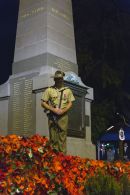| Cover |
| The Iraq War Fueled the Destruction of the Middle East |
 |
The Iraq War Fueled the Destruction of the Middle East New York César Chelala Fifteen years after it started, the Iraq war has nearly destroyed the country, one of the most prosperous in the Middle East, and destabilized the whole region by intensifying internecine and religious conflicts and giving rise to new and violent groups. And the human and material costs of the war keep mounting. In addition to the American soldiers who were killed or injured, the war has had a considerable negative effect on the U.S. economy. The war has also had a negative impact on U.S. troops’ morale There has also been a high rate of suicides prevalent among those returning from the war. Like a malicious octopus, the ill-named Operation Iraqi Freedom (OIF) has extended its deadly tentacles into nearby countries, and turned the region into the unmanageable mess it is today. Major Danny Sjursen, a U.S. Army strategist who fought in Iraq recently wrote, “That ill-fated farce of an invasion either created the conditions, or exacerbated the existing tensions, which inform today’s regional wars.” The war has increased Sunni-Shiite tension, fostered the emergence of Al-Qaeda in Iraq, and strengthened Iran as a military power in the region. Following the U.S. led invasion, the Iraqi Shiite Arab majority took a central role in government, an unprecedented event in the Middle East, which also encouraged the Shiites across the region. In a persistent crisis, the Sunnis in Iraq rebelled against the Iraqi Shiites, launching a rebellion against them that has claimed tens of thousands of lives. There was no Al-Qaeda in Iraq before the U.S. and British invasion. It first appeared in Iraq in 2004, when Abu Musab al-Zarqawi formed an alliance with Al-Qaeda, pledging his allegiance to Osama bin Laden in return for his endorsement as the leader of the group’s franchise in Iraq. Al-Qaeda’s main targets were Iraqi Shiites, whom they attacked during religious processions or at their mosques and shrines. After 2007, Al-Qaeda was considerably weakened after the U.S. funded Sunni groups called “Awakening Councils” to expel this organization from Iraq. Although less powerful than during its peak years, Al-Qaeda continues to be active in its violent activities, whose targets now also include Syria and Yemen. Al-Qaeda in the Arabian Peninsula (AQAP), the Yemeni branch of Al-Qaeda, is now thriving in Yemen, taking advantage of the chaotic environment in the country. A ravaged country, Yemen continues to be one of the poorest countries in the world. In Syria, Al-Qaeda still has a presence, albeit less powerful now. Jabhat al-Nusra, Al-Qaeda’s ideological heir, and Hay’et Tahrir al-Sham (HTS), the group it formed, remain in eastern Ghouta, northern Hama and western Aleppo provinces, contributing to the prolongation of Syria’s bloody war. At the same time, the militants of ISIS, the brutal offshoot of Al-Qaeda, have no restraints in pursuing brutal tactics to cement an Islamic emirate. In an ISIS propaganda video, after bulldozing the Syrian-Iraq border, an ISIS militant says, “We will break the barrier of Iraq, Jordan, Lebanon, all the countries. This is the first of many barriers we will break.” The Iraq war has proved to be a disaster for the Middle East. The destruction of Iraq, Syria, the ravaging of Yemen and a region swamped in weapons are connected, either directly or indirectly, to the Iraq war. It may be tempting to think that the war had some redeeming value. However, considering its consequences, one can only conclude that nothing will assuage the savage wounds of this senseless war. César Chelala is an international public health consultant and the foreign correspondent for The Middle East Times International (Australia). |
 |
 |
 |
|
|
|||||||||
|
|||||||||

















